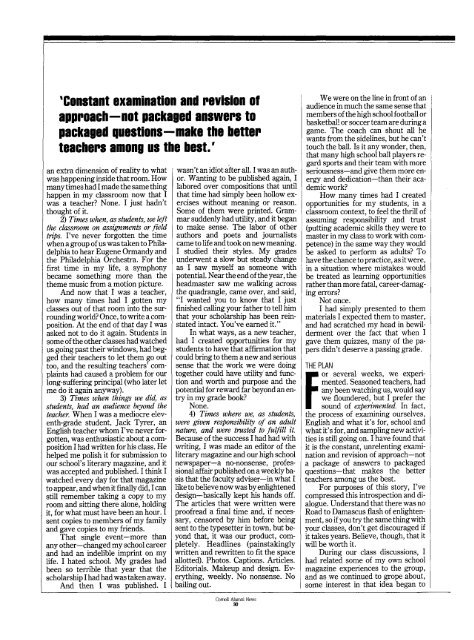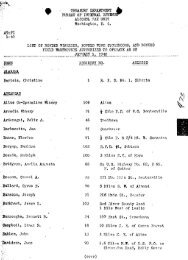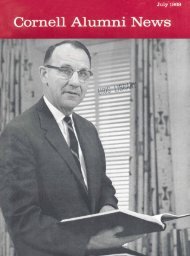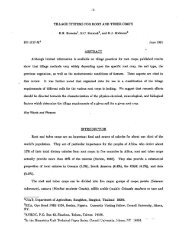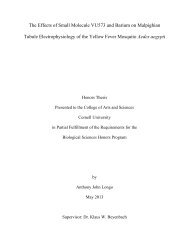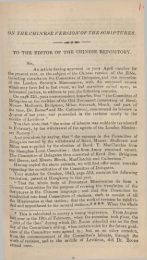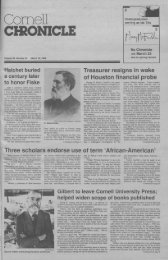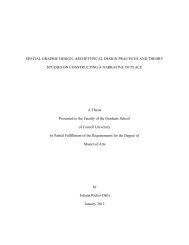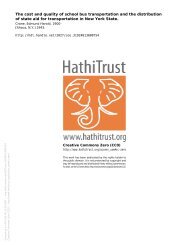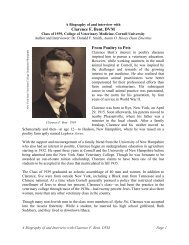City Views - eCommons@Cornell - Cornell University
City Views - eCommons@Cornell - Cornell University
City Views - eCommons@Cornell - Cornell University
Create successful ePaper yourself
Turn your PDF publications into a flip-book with our unique Google optimized e-Paper software.
'Constant examination and revision of<br />
approach—not packaged answers to<br />
packaged questions—make the better<br />
teachers among us the best.'<br />
an extra dimension of reality to what<br />
was happening inside that room. How<br />
many times had I made the same thing<br />
happen in my classroom now that I<br />
was a teacher? None. I just hadn't<br />
thought of it.<br />
2) Times when, as students, we left<br />
the classroom on assignments or field<br />
trips. Γve never forgotten the time<br />
when a group of us was taken to Philadelphia<br />
to hear Eugene Ormandy and<br />
the Philadelphia Orchestra. For the<br />
first time in my life, a symphony<br />
became something more than the<br />
theme music from a motion picture.<br />
And now that I was a teacher,<br />
how many times had I gotten my<br />
classes out of that room into the surrounding<br />
world? Once, to write a composition.<br />
At the end of that day I was<br />
asked not to do it again. Students in<br />
some of the other classes had watched<br />
us going past their windows, had begged<br />
their teachers to let them go out<br />
too, and the resulting teachers' complaints<br />
had caused a problem for our<br />
long-suffering principal (who later let<br />
me do it again anyway).<br />
3) Times when things we did, as<br />
students, had an audience beyond the<br />
teacher. When I was a mediocre eleventh-grade<br />
student, Jack Tyrer, an<br />
English teacher whom Γve never forgotten,<br />
was enthusiastic about a composition<br />
I had written for his class. He<br />
helped me polish it for submission to<br />
our schooΓs literary magazine, and it<br />
was accepted and published. I think I<br />
watched every day for that magazine<br />
to appear, and when it finally did, I can<br />
still remember taking a copy to my<br />
room and sitting there alone, holding<br />
it, for what must have been an hour. I<br />
sent copies to members of my family<br />
and gave copies to my friends.<br />
That single event—more than<br />
any other—changed my school career<br />
and had an indelible imprint on my<br />
life. I hated school. My grades had<br />
been so terrible that year that the<br />
scholarship I had had was taken away.<br />
And then I was published. I<br />
wasn't an idiot after all. I was an author.<br />
Wanting to be published again, I<br />
labored over compositions that until<br />
that time had simply been hollow exercises<br />
without meaning or reason.<br />
Some of them were printed. Grammar<br />
suddenly had utility, and it began<br />
to make sense. The labor of other<br />
authors and poets and journalists<br />
came to life and took on new meaning.<br />
I studied their styles. My grades<br />
underwent a slow but steady change<br />
as I saw myself as someone with<br />
potential. Near the end of the year, the<br />
headmaster saw me walking across<br />
the quadrangle, came over, and said,<br />
"I wanted you to know that I just<br />
finished calling your father to tell him<br />
that your scholarship has been reinstated<br />
intact. You've earned it."<br />
In what ways, as a new teacher,<br />
had I created opportunities for my<br />
students to have that affirmation that<br />
could bring to them a new and serious<br />
sense that the work we were doing<br />
together could have utility and function<br />
and worth and purpose and the<br />
potential for reward far beyond an entry<br />
in my grade book?<br />
None.<br />
4) Times where we, as students,<br />
were given responsibility of an adult<br />
nature, and were trusted to fulfill it.<br />
Because of the success I had had with<br />
writing, I was made an editor of the<br />
literary magazine and our high school<br />
newspaper—a no-nonsense, professional<br />
affair published on a weekly basis<br />
that the faculty adviser—in what I<br />
like to believe now was by enlightened<br />
design—basically kept his hands off.<br />
The articles that were written were<br />
proofread a final time and, if necessary,<br />
censored by him before being<br />
sent to the typesetter in town, but beyond<br />
that, it was our product, completely.<br />
Headlines (painstakingly<br />
written and rewritten to fit the space<br />
allotted). Photos. Captions. Articles.<br />
Editorials. Makeup and design. Everything,<br />
weekly. No nonsense. No<br />
bailing out.<br />
We were on the line in front of an<br />
audience in much the same sense that<br />
members of the high school football or<br />
basketball or soccer team are during a<br />
game. The coach can shout all he<br />
wants from the sidelines, but he can't<br />
touch the ball. Is it any wonder, then,<br />
that many high school ball players regard<br />
sports and their team with more<br />
seriousness—and give them more energy<br />
and dedication—than their academic<br />
work?<br />
How many times had I created<br />
opportunities for my students, in a<br />
classroom context, to feel the thrill of<br />
assuming responsibility and trust<br />
(putting academic skills they were to<br />
master in my class to work with competence)<br />
in the same way they would<br />
be asked to perform as adults? To<br />
have the chance to practice, as it were,<br />
in a situation where mistakes would<br />
be treated as learning opportunities<br />
rather than more fatal, career-damaging<br />
errors?<br />
Not once.<br />
I had simply presented to them<br />
materials I expected them to master,<br />
and had scratched my head in bewilderment<br />
over the fact that when I<br />
gave them quizzes, many of the papers<br />
didn't deserve a passing grade.<br />
THE PLAN<br />
For several weeks, we experimented.<br />
Seasoned teachers, had<br />
any been watching us, would say<br />
we floundered, but I prefer the<br />
sound of experimented. In fact,<br />
the process of examining ourselves,<br />
English and what it's for, school and<br />
what it's for, and sampling new activities<br />
is still going on. I have found that<br />
it is the constant, unrelenting examination<br />
and revision of approach—not<br />
a package of answers to packaged<br />
questions—that makes the better<br />
teachers among us the best.<br />
For purposes of this story, I've<br />
compressed this introspection and dialogue.<br />
Understand that there was no<br />
Road to Damascus flash of enlightenment,<br />
so if you try the same thing with<br />
your classes, don't get discouraged if<br />
it takes years. Believe, though, that it<br />
will be worth it.<br />
During our class discussions, I<br />
had related some of my own school<br />
magazine experiences to the group,<br />
and as we continued to grope about,<br />
some interest in that idea began to<br />
<strong>Cornell</strong> Alumni News<br />
30


